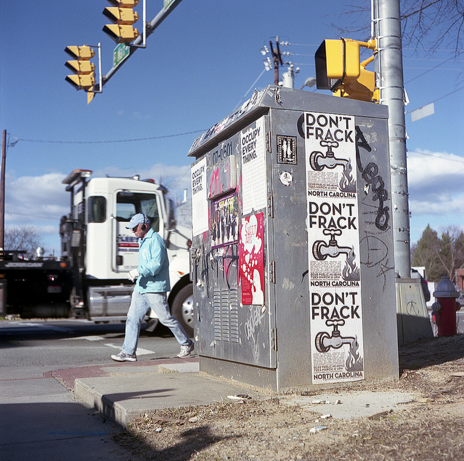Fracking's democracy disconnect

Though North Carolina lawmakers have acted aggressively to promote fracking, it turns out the majority of the state's residents oppose the controversial method of gas drilling.
A new poll released today by the Natural Resources Defense Council (NRDC) found that 55 percent of North Carolinians statewide oppose proposals to open up the state to fracking, which involves pumping massive amounts of water and chemicals underground to extract natural gas. And two-thirds of those opposed, or 35 percent of all North Carolina residents, say they are strongly opposed.
The areas of the state where people most strongly reject fracking are the Triangle (59 percent), the easternmost and westernmost parts of the state (55 percent), and the Charlotte metro area (53 percent). Fracking is opposed by 48 percent of Triad area residents.
Only 37 percent of North Carolinians support fracking, according to the poll.
The survey also found that 71 percent of North Carolina residents said they would "have serious concerns" about a lawmaker who voted to remove established safeguards on fracking that protect air and water quality. The drilling method has been linked to health-damaging air and water pollution.
In addition, 75 percent of respondents said current North Carolina environmental standards and regulatory safeguards are about right or too weak, while only 13 percent think they are too strong. About 56 percent of those surveyed oppose the effort by some lawmakers to repeal the state's clean energy standard. That effort appears dead for now after meeting opposition from business interests.
"From the mountains to the beaches, it's clear that North Carolinians take special pride in their state, and see state environmental safeguards as protecting our heritage and ensuring that our children can enjoy this place we know and love," said NRDC senior attorney Luis Martinez, who is based in Asheville, N.C.
The NRDC poll findings are the latest evidence suggesting that fracking and democracy mix about as well as oil and water. In North Carolina, pro-fracking bullies have repeatedly attempted to ignore the will of the people.
For example, last year in a controversial late-night vote the North Carolina legislature overrode former Gov. Beverly Perdue's (D) veto of a bill to lift the state's fracking ban -- but only after one Democratic lawmaker incorrectly voted in favor of the override and was not allowed to correct her vote by Republican House leaders. It later came to light that the House leadership had tried to engineer the vote to be taken when key Democrats were out of the room.
The legislation to allow fracking in the state set up a N.C. Mining and Energy Commission (MEC) to craft regulations overseeing the process, and this year the group has been working to draw up a strict rule requiring fracking companies to disclose the chemicals they use. But last month in a surprise move, a Senate committee revised a House bill to allow oil and gas companies to designate fracking chemicals as "trade secrets" and require their disclosure only in cases where state regulators declare that a situation endangers public health or the environment. The move drew protests from the MEC.
During the discussion of the Senate legislation, MEC members expressed concerns about energy companies bypassing the group and privately negotiating fracking standards with state lawmakers. Among the companies reportedly involved in those behind-the-scenes negotiations was Halliburton, which earlier this year blocked the MEC from adopting a strict disclosure rule after complaining to Gov. Pat McCrory's (R) administration that the rule went too far.
A study released last year by N.C. Voters for Clean Elections found that the political action committees of companies with an interest in fracking contributed over $730,000 to North Carolina lawmakers' campaigns between 2009 and 2011. Halliburton was not among the companies looked at in that report, but the Texas-based fracking pioneer has two registered lobbyists making the case for its interests at the North Carolina legislature. One of those lobbyists, D. Bowen Heath of McGuireWoods Consulting, also lobbies for fracking giant Koch Industries, which has dramatically increased its political spending in North Carolina in recent years.
Meanwhile, the American Petroleum Institute, a trade association for oil and gas companies, hosted a reception for North Carolina lawmakers at a posh club in Raleigh, N.C., with the event costing $3,080, The Nation reports. API also hosted a reception that cost $2,897 for three state senators including Bob Rucho of Mecklenburg County, who has been among the leaders of the effort to fast-track fracking.
Besides detailing public opposition to fracking, NRDC's poll also found widespread dissatisfaction with the state legislature, both chambers of which are now controlled by Republican supermajorities. Forty-four percent of respondents said they disapprove of the job the state legislature is doing, while only 40 percent approve. The poll was conducted in late June by GBA Strategies of Washington, D.C.
"Given the results of this survey," the pollsters write in their summary of findings, "it's clear these lawmakers are inviting major public backlash should they continue putting the concerns of corporate special interests ahead of the concerns of regular people in North Carolina."
Tags
Sue Sturgis
Sue is the former editorial director of Facing South and the Institute for Southern Studies.
